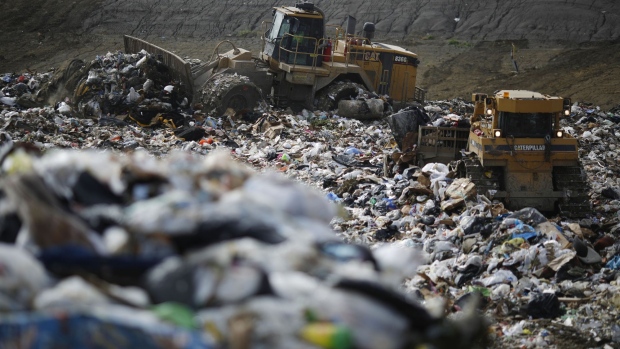Feb 2, 2023
Making Companies Pay for Trash They Produce Boosts Recycling, Study Finds
, Bloomberg News

(Bloomberg) -- US states could increase their recycling rates for printed paper and packaging by almost 50% if they adopted laws making manufacturers bear some responsibility for the afterlife of their products, according to a report released Thursday.
Extended producer responsibility (EPR) laws are common in Asia and Europe but are just getting a foothold in the US. They require companies that make products that pile up in landfills to join or fund organizations that facilitate recycling of those products. In 2021, Maine and Oregon became the first states to pass such laws for paper and plastic packaging. Colorado and California then followed last year.
The Recycling Partnership, an industry-financed NGO based in the US that advocates for improving recycling infrastructure and accessibility, examined the outcomes of EPR laws in seven different jurisdictions across the globe, from South Korea to British Columbia in Canada, selected for their variability in size, geographic location and policy approach. The study found that despite those differences, the recycling rates for target materials across five of the jurisdictions surged to over 75% and rose to over 60% in the remaining two. In Belgium and Spain the before and after were particularly dramatic, with rates jumping from 10% or below to over 80%.
Dylan de Thomas, the lead author of the report and the group’s vice president of public policy and government affairs, said there were several reasons for the jumps. The laws provide more money for infrastructure like sorting facilities and mandate equal access to the same recycling options to all communities, whether urban or rural. They also provide a financial incentive for manufacturers to redesign their packaging to be less wasteful.
The analysis shows that similar approaches in the US would yield equivalent increases in the collection and processing of such waste, de Thomas said. “Recycling, especially in the US, grew up in a haphazard way,” he said. “This is an organizing principle, instead of a community-by-community solution.”
He cited his home state of Oregon, which enacted an EPR law in 2021, as an example of how it might work. “It’s now possible to recycle many more materials in Portland than in coastal areas,” he said. “After the law is implemented, everyone will have the same recycling system. That’s one of the big benefits of EPR — everyone gets the same access, as they do to trash.”
Interest in EPR laws is rising in tandem with awareness of plastic pollution. Plastic is clogging landfills, oceans and streams and harming wildlife. Microplastics have been found in human blood and breast milk.
Recycling rates in the US, particularly for plastic packaging, are dismal. The nation recycled less than 9% of the plastic it generated in 2018, according to the Environmental Protection Agency.
©2023 Bloomberg L.P.


